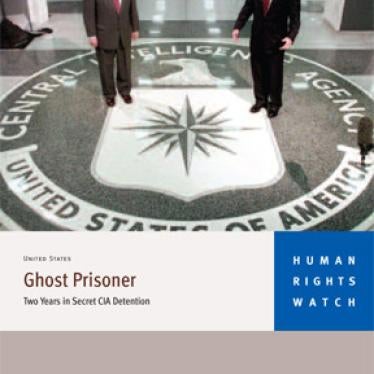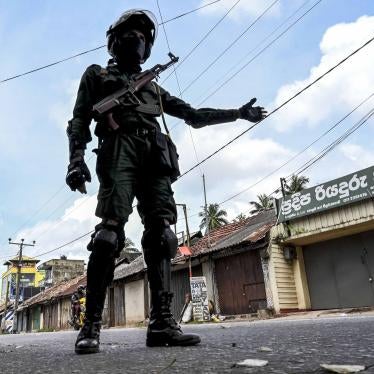(New York) – The US government should account for all the missing detainees once held by the Central Intelligence Agency (CIA), Human Rights Watch said in a report released today.
The 50-page report, “Ghost Prisoner: Two Years in Secret CIA Detention,” contains a detailed description of a secret CIA prison from a Palestinian former detainee who was released from custody last year. Human Rights Watch has also sent a public letter to US President George W. Bush requesting information about the fate and whereabouts of the missing detainees.
“President Bush told us that the last 14 CIA prisoners were sent to Guantanamo, but there are many other prisoners ‘disappeared’ by the CIA whose fate is still unknown,” said Joanne Mariner, terrorism and counterterrorism director at Human Rights Watch. “The question is: what happened to these people and where are they now?”
In early September, 14 detainees were transferred from secret CIA prisons to military custody at Guantanamo Bay. In a televised speech on September 6, President Bush announced that with those 14 transfers, no prisoners were left in CIA custody.
The former CIA detainee, Marwan Jabour, told Human Rights Watch about a number of other people who were in CIA detention but whose present whereabouts are unknown. Jabour saw one of these men, Algerian terrorism suspect Yassir al-Jazeeri, as recently as July 2006 in CIA custody.
“The Bush administration needs to provide a full accounting of everyone who was ‘disappeared’ into CIA prisons, including their names, locations, and when they left US custody,” Mariner said.
Human Rights Watch’s letter to Bush contained two lists of missing detainees. The first list names 16 people whom Human Rights Watch believes were held in CIA prisons and whose current whereabouts are unknown. The second list names 22 people who may have been held in CIA prisons and whose current whereabouts are unknown.
Human Rights Watch expressed concern about what may have happened to the missing prisoners. One possibility is that the US may have transferred some of them to foreign prisons where they remain under the CIA’s effective control.
Another worrying possibility is that prisoners were transferred from CIA custody to places where they may face torture. A serious concern is that some of the missing prisoners might have been returned to their countries of origin, which include Algeria, Egypt, Libya and Syria, where the torture of terrorism suspects is common.
The new report provides the most comprehensive account to date of life in a secret CIA prison, as well as new information regarding 38 possible detainees. The report explains that these prisoners’ treatment by the CIA constitutes enforced disappearance, a practice that is absolutely prohibited under international law.
Marwan Jabour was arrested by Pakistani authorities in May 2004 in Pakistan and held for more than a month at a secret facility in Islamabad operated by both US and Pakistani personnel, during which time he was badly abused. In June, he was flown to another secret prison, which he believes was in Afghanistan, where all or nearly all of the personnel were American.
His clothes were taken from him when he arrived, and he was left completely naked for a month and a half, including during questioning by women interrogators and filming. He was chained tightly to the wall of his small cell so that he could not stand up, placed in painful stress positions so that he had difficulty breathing, and told that if he did not cooperate he would be put in a suffocating “dog box.”
During the more than two years that he was held in this secret prison, Jabour spent nearly all of his time alone in a windowless cell, with little human contact besides his captors. Although he worried incessantly about his wife and three young daughters, he was not allowed even to send them a letter to reassure them that he was alive.
“It was a grave,” Jabour later told Human Rights Watch. “I felt like my life was over.”
The wife of another former CIA detainee whose whereabouts remain unknown told Human Rights Watch that she has had to lie to her four children about her husband’s “disappearance.” She explained that she could not bear telling them that she did not know where he was.
“What I’m hoping,” she said, “is if they find out their father has been detained, that I’ll at least be able to tell them what country he’s being held in, and in what conditions.”
Enforced disappearance involves arbitrary, secret and incommunicado detention, and poses a serious risk to the right to life and to protection from torture and other mistreatment. As these cases make clear, enforced disappearance also inflicts severe mental pain and suffering on the “disappeared” person’s family.
Human Rights Watch expressed grave concern about President Bush’s stated view that the Military Commissions Act of 2006 permits the government to restart the CIA’s secret prison program. Human Rights Watch called upon the Bush administration to reject the use of secret detention and coercive interrogation as tactics in fighting terrorism, and announce that the CIA’s detention and interrogation program has been permanently discontinued.
“The CIA program – and the civilian leaders who created it – have inflicted tremendous harm on the reputation, moral standing, and integrity of the United States,” Mariner said. “It’s time for President Bush to repudiate this program, and to take steps to repair the damage it has done.”







